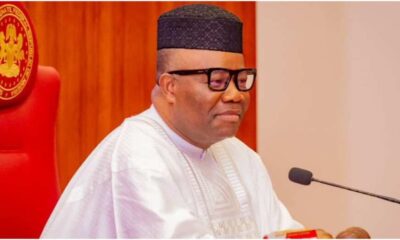Economy
Recapitalisation: TCN to Waive N270bn Discos’ Debts
Published
5 years agoon

- Recapitalisation: TCN to Waive N270bn Discos’ Debts
Nigeria’s power distribution companies currently owed the Transmission Company of Nigeria N270bn and TCN is willing to forgo this debt in order to have the Discos recapitalised and salvage the sector from collapse, Okechukwu Nnodim reports.
The total indebtedness of the 11 power distribution companies to the Transmission Company of Nigeria now stands at about N270bn and this huge sum might be waived should there be a recapitalisation of the Discos.
TCN transmits the power generated by electricity generation companies to power distributors, who then distribute the product to final consumers.
Discos collect funds from power consumers on behalf of other operators in the sector, but latest findings from the sector showed that the indebtedness of the power distributors to TCN alone had grown to about N270bn.
In separate interviews with our correspondent, as well as recent power sector events in Abuja, operators in the generation, transmission, regulatory and distribution arms of the industry complained about how the sector had been nose-diving since it was privatised more than five years ago.
To help forestall the persistent fall in the power market, the Managing Director, TCN, Usman Mohammed, declared that it had become vital to correct the error that was done when the sector was privatised.
Nigeria’s power sector was officially privatised in November 2013 when the successor distribution and generation companies of the defunct Power Holding Company of Nigeria were sold and handed over to private investors.
Mohammed, who spoke in Abuja on Friday, explained that most power assets were sold to investors that lacked capacity for long term investments, adding that this had created serious liquidity strain in the power market.
To address this problem, he stated that his organisation had submitted some of its findings and proposals to the Federal Government and that TCN was ready to forgo the N270bn which power distributors currently owe the transmission company in order to salvage the sector from collapse.
Mohammed said, “We (Nigeria) have succeeded in selling our assets to mostly Nigerian investors who do not have capacity for long- term investment. They don’t have capacity. Now, Nigerian banks came in and the Discos went there to collect money.
“These monies were short term in nature, very expensive and not ideal for this kind of investment and this is one of the major problems that we are facing right now in the sector.”
When asked how get to out of the problem, Mohammed replied, “We have proposed how to get out of this problem and some people will say, cancel the privatisation but I don’t think that is the right thing to do. Why? If it is cancelled, we will be sending a wrong signal to the international community that Nigeria is not a private sector investment destination.
“So what should we do? This is why we are proposing recapitalisation, where government should bring its own 40 per cent in the distribution companies, while the owners of the Discos bring their own 60 per cent.
“For TCN, the Discos are owing us about N270bn right now. We are ready to forgo that N270bn in as much as we have a market that can work. So we are saying reset the books, remove their debt and make their books clean.”
Mohammed stated that there will be some strong regulatory certainties from the Nigerian Electricity Regulatory Commission, as well as the provision of a tariff that would support the recapitalisation exercise in order to make it work efficiently.
But the Discos had earlier outlined the conditions for them to recapitalise, as the Chief Executive Officer, Association of Nigerian Electricity Distrbutors, Azu Obiaya, recently stated that the recapitalisation being canvassed by the TCN would happen when investors in the Discos see a pathway of recovering their investments.
In his address at the recent two-day second seminar for the preparation of Performance Improvement Plans by Nigerian Discos, Obiaya observed that there had been so much calls for the recapitalisation of Discos.
Responding to the calls for Discos’ recapitalisation, he stated that rational investors would need to see how they would recoup their investments before they could go ahead to recapitalise the firms.
Obiaya said, “Recently, there has been a drumbeat for recapitalisation of the Discos. There are two principal approaches to recapitalisation – one, we won’t mention today and the other is investment. For the latter to occur, rational investors would need to see a pathway of recovering their investment for them to make the leap.
“It is my hope that the PIP guidelines, if implemented faithfully, efficiently and consistently, will provide this pathway, as necessary to re-orientate the sector towards commercial viability and sustainability.”
Also speaking on the crisis in the sector, power generators faulted both the Discos and TCN, as the generation companies called for strict regulatory regime in order to address the flaws by operators.
The Executive Secretary, Association of Power Generation Companies – an umbrella body for power generators in Nigeria, Joy Ogaji, told our correspondent that the failure in the enforcement of performance through regulation had further worsened the crisis in the industry.
She said, “The failure on enforcement of performance and efficiency towards optimal utilisation will lead all computations for a full return on investment thrown into chaos. So the solution is in developing and implementing a sanction regime for poor performance for all participants in the power sector.”
Ogaji also noted that findings by the APGC showed that power distributors could not account for up to 75 per cent of the power they distribute to end users in terms of revenue remitted to the Nigerian Bulk Electricity Trading company.
NBET, an agency of the Federal Government, collects revenue from the Discos on behalf of other operators in the sector.
Ogaji stated that the inability of the Discos to make the right revenue collections was also compounding the losses of Gencos, as the generators were losing over 6,000MW of energy, because they make no revenue from that quantum of power.
She said, “The technical and operational inefficiencies by these operators (TCN and Discos) negatively impact the Gencos in different ways. With a total available generation capacity of more than 7,500MW and maximum (TCN) wheeling capacity of not more than 5,500MW, there will always be a recurring instance of about 2,000MW idle generation.”
Idle generation represents capital investment not able to yield revenue that will impact the ability of the Gencos to support efficient operations and service loans used in developing the power plants.
Ogaji said, “Out of the meagre 5,500MW of transmission wheeling capacity, the Discos have not proven to be able to distribute more than 4,500MW continuously, leaving yet another 1,000MW of generation capacity unutilised.
“In total, due to the combined technical incapacitation of TCN and the Discos, the Gencos are unable to deploy a total of 3,000MW of capacity that would ensure sustainable and profitable operations.
“If one considers the fact that the Discos have in the recent past been operating around 3,500MW or below, this figure escalates to 4,000MW of idle capacity. In addition to the issues of incapacity as outlined above, the Discos are also unable to account for up to 75 per cent of the power they have distributed to end users in terms of revenue remitted to the bulk electricity trader.”
She added, “In real terms, factoring the impact of poor revenue remittance, the issues facing the Gencos are those of 4,000MW idle generation and 2,625MW of stranded power (0.75 multiplied by 3,500MW).
“In effect, the Gencos are not able to deploy a total of 4,000MW of idle power, and out of the 3,500MW wheeled by TCN on demand by Discos, the Discos only remit about 25 per cent (875MW) of this power as revenue to bulk trader, making a total of 6,625MW generation capacity not yielding revenue for the Gencos.”
Is the CEO and Founder of Investors King Limited. He is a seasoned foreign exchange research analyst and a published author on Yahoo Finance, Business Insider, Nasdaq, Entrepreneur.com, Investorplace, and other prominent platforms. With over two decades of experience in global financial markets, Olukoya is well-recognized in the industry.

You may like
-


We Can’t Develop Without Addressing Power Crisis – VP Shettima
-





Minister Adelabu: 150MW National Grid Expansion to Be Completed by Year-End
-








Nationwide Blackout As National Grid Collapses Again Despite FG’s Permanent Fix Assurance
-








FG To Spend N2.4 Trillion On Electricity Subsidy Before End Of 2024
-




Senate Slams Power Sector, Threatens Reversal of Privatisation Policy
-


Sanwo-Olu Signs Lagos Electricity Bill into Law



